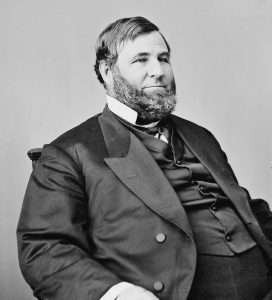The Volokh Conspiracy
Mostly law professors | Sometimes contrarian | Often libertarian | Always independent
Today in Supreme Court History: October 17, 1862
10/17/1862: Justice David Davis takes oath.

Editor's Note: We invite comments and request that they be civil and on-topic. We do not moderate or assume any responsibility for comments, which are owned by the readers who post them. Comments do not represent the views of Reason.com or Reason Foundation. We reserve the right to delete any comment for any reason at any time. Comments may only be edited within 5 minutes of posting. Report abuses.
Please to post comments


McPherson v. Blacker, 146 U.S. 1 (decided October 17, 1892): rejects argument that under art. 2, §1, clause 2 (Electors from states shall be appointed "in such manner as the legislature thereof may direct") electors have to be chosen by the Legislature itself, acting as a unit; upholds Michigan statute (i.e., an Act of the Legislature) directing Electors to be elected by Congressional district; mandamus is proper vehicle to determine this dispute because election is imminent
The Silvia, 171 U.S. 462 (decided October 17, 1898): shippers of sugar damaged by leaking vessel could not recover because damage due to bad weather not unseaworthiness; the opinion contains details of proper methods in those days of battening hatches, sealing ports, etc.
United States v. Chicago, Milwaukee & St. Paul Ry. Co, 218 U.S. 233 (decided October 17, 1910): U.S. sued to get back land erroneously "patented" to railroad (actually, to disgorge proceeds from subsequent sale); U.S. could not recover for tracts which were already judicially declared swampland and so not included in the patent as defined
That Michigan law sounds a lot like the current law in Nebraska and Maine.
It sounds more radical -- allocating all electoral votes by CD. Maine and Nebraska have a hybrid system: the statewide winner gets 2 votes, and the remaining votes are allocated by Congressional district, one elector for each (2 in Maine, 3 in Nebraska). From what I can quickly look up, after 1896 Michigan reverted to the usual winner-takes-all.
A state’s total electoral votes equal its number of representatives plus its number of senators, in other words, its number of congressional districts plus two. Obviously, a state could not allocate those “plus two” by congressional district per se. It could, presumably, do something odd to split them, but the logical thing would be to just give both to the statewide winner.
Though, in fact, nothing in the Constitution requires a state to have a popular election for President at all. A state legislature could directly choose presidential electors, though no state has done so since 1876. One (of many) obvious problems with this method is a split legislature that would be unable to agree on which electors to pick. This is exactly what happened in New York in the very first presidential election, so New York ended up not participating in the 1788 election of George Washington.
The original idea was to have state legislatures select Senators and Electors, the Electors being independent actors as to how they would vote for President. The Framers distrusted democracy of the people as a whole, and gave a lot of power to the states (where legislatures were not based on one man one vote, but selected by the elites). This idea has been rejected except insofar as it benefits Republicans.